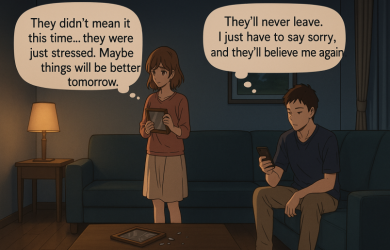The Two Kinds of Abusers: Why It Is Hard to Leave Them

Key Takeaways
Marriage.com AI Quick Summary
People often wonder how come there are so many women who get battered and who often suffer unspeakable mistreatment, but stay with their aggressor. And it is a complex question that is yet to be fully understood. However, we do already know a lot about the dynamics between the abuser and his victim, and about the hidden insecurities that plague the relationship and both involved. And what is more, we know a lot about those who physically abuse the women they were supposed to care for and protect from harm. There are two kinds of abusers, and both are hard to leave in a different way.
1. Slow simmer type of abuser
When her husband’s car pulls into the driveway, she has a feeling that something will go wrong today. And it’s not some supernatural intuition, it’s just that the cycle has been repeating for years and she knows when the time is near for her husband to lose his rag and become violent again. It’s been awhile since the last time he hit her, then apologized for days, promised he would never do it again. And then everybody forgot about the apologies and the tension started to mount again. Today, whatever she says or does will be wrong, she will be to blame for everything, and however she reacts, the inevitable will happen – he will start yelling and fighting, when she responds (however she might respond) he will become violent, and the cycle will start all over. This is one of two types of abusers, a slow-simmering abuser. Even though there is an apparent warning that the violence will come in the strain that builds up between the abuser and the victim, there is not much the victim could have done to prevent the aggression that is to come. These men are easier to leave than the next type we will describe, but it is also harder not to go back to them. They will typically beg for forgiveness, pursue their victims, and this usually turns into another, only even more serious, episode of violence, as they can harm their exes, stalk them, and potentially even kill them when they don’t respond to their apologies and promises.
2. Short fuse type of abuser
The second type of abusers is arguably more frightening and more dangerous one because with them there’s no gradual building up of the tension. It all seemed like a perfect day for J. and her boyfriend. They laughed, had fun together, went to a concert and just were having a great day. At the concert, a guy approached J. when her boyfriend went to get drinks. She didn’t seem to turn him down quickly enough for her boyfriend. He appeared completely calm when he took her outside and in a blink of an eye, silently, he hit her so hard that she fell on the ground. “Don’t disrespect me” was all that he said. These men react instantly and go from zero to hundred in a flash. There’s no warning, but also no stopping them. And leaving such man proves to be more difficult than with the previous type of abuser, for two reasons. Victims are often mesmerized by their partners in a pathological way, and also – they justifiably fear for their lives if they left their abuser. These men see their women as their property and if they don’t obey, they are never far from teaching them a lesson.
What is interesting and often discouraging for women who fall victims to these men is that, as it seems, there’s no coming back once the abusing episode begins. Whether it is a lightning-fast reaction with no warning, or a slowly developing disaster, once the “switch” flips, there’s no way to stop the storm of aggression and belligerence. Each relationship has its own course, and every generalization is necessarily a bit inaccurate. But one thing is for certain – physical violence in a relationship is a devastating and dangerous situation to be in. Whether it is couples’ counseling or leaving the abuser, something has to be done, and has to be done quickly. The first step is having a clear picture of what is really happening. It is not a passing thing, it will not go away, and it is not prettier than it seems. So if you are a victim of abuse, ask for help, because you will need it, and bravely end the unhealthy situation you are in.
 Tips
Tips
Write your tip or submit a video tip
All tips are reviewed before the publishing.
Share this article on
Want to have a happier, healthier marriage?
If you feel disconnected or frustrated about the state of your marriage but want to avoid separation and/or divorce, the marriage.com course meant for married couples is an excellent resource to help you overcome the most challenging aspects of being married.
Recent Articles
Related Quizzes
Unlock Daily 30-Sec Tips for a Happier, Healthier Relationship
👉 Subscribe FREE on YouTube We'd love your feedback!
We'd love your feedback!
 Expert Q&A
Expert Q&A
Ask your question related to this topic & get the support you deserve from experts.


















 Thanks for your feedback!
Thanks for your feedback!